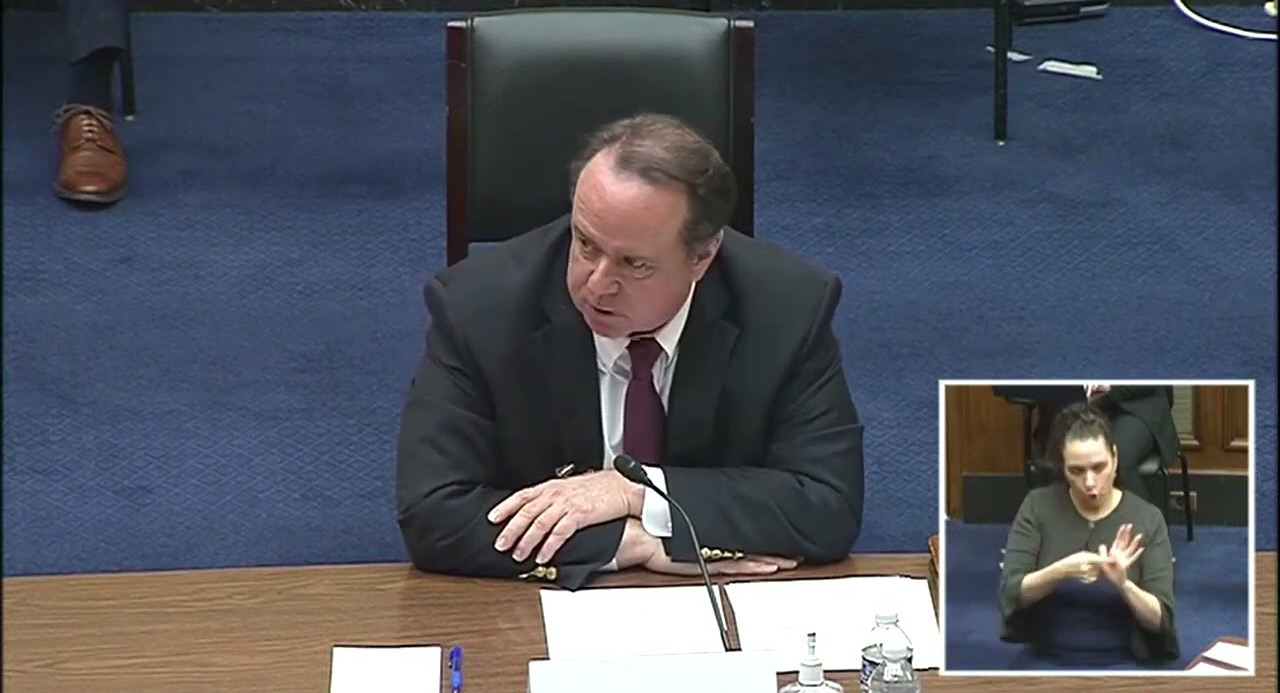Testimony: Christopher B. Briggs
Hearing: “Examining Pathways to Universal Health Coverage”
Committee on Oversight and Reform
House of Representatives
29 March 2022
Watch the Video
Chairwoman Maloney, Ranking Member Comer, and Members of the House Committee on Oversight and Reform, please allow me to thank you for the opportunity to testify before you.
In November 2015, my wife got the most dreadful call a parent can get. The doctor knew why our daughter Colette, then 2 ½, hadn’t been feeling well. Blood work had revealed—leukemia. We raced Colette to Inova Fairfax hospital, the only one in northern Virginia, where we live, that treats pediatric cancer—and got there just in time.
Thanks to Obamacare, we were already in difficult straits regarding healthcare. In 2014, the law had eliminated a great plan we had had for years. Before the Affordable Care Act (ACA) the private marketplace—consistently, reliably—had offered us a wide variety of relatively inexpensive plans that covered specialist care, even out of state.
After the ACA went into effect, however, all that was left were increasingly costly plans with fewer benefits. Including fewer doctors and fewer hospitals.
Thanks to Obamacare we were—and still are—basically restricted to medical facilities within a short radius of our zip code. Obamacare has made us into medical serfs—tied to the land, unable to leave it, even to save a little girl battling cancer. Which is why, when we tried to take Colette to Johns Hopkins, just up the road in Baltimore, we were denied. Under our pre-ACA plan, which didn’t “geofence” sick children from the care they needed, she would have been admitted.
Our predicament was made all the more painful by swelling premiums—as well as by skyrocketing deductible and maximum-out-of-pocket expenses.
But things were about to get much worse than expensive. In mid-2017, President Trump merely suggested the scrapping of the massive Obamacare payments to the insurance giants, which were delivering worse care at ever-greater cost. In response—because Obamacare permits such things—every insurer in northern Virginia with a family plan, including the one we had, announced it was pulling out for the following year (2018).
Except one. But Cigna Connect wouldn’t cover Colette at Inova Fairfax, the one hospital in northern Virginia, as I say, with a pediatric cancer ward.
Under Obamacare, our daughter was effectively without coverage for cancer. Not the common cold—but cancer.
We went through another terrifying event in 2020. In mid-March of that year—with Covid sweeping the country—Anthem, the plan we had for that year, announced that on 1 April it would no longer cover, not the hospital, but the clinic. Perhaps the marketplace, which we called, would grant us a waiver to buy the Cigna plan still for sale in our zip code? No, emphatically not. The failure of the ACA to cover our daughter battling a terminal illness was not a “qualifying event.”
So, once again, thanks to the ACA, we were left without coverage for our daughter recovering from cancer—this time at the only pediatric cancer clinic in northern Virginia.
In both cases of system collapse, we were forced to turn to the author of these failures: that is, to the government. In other words, to all of you. Specifically, we called Virginia Senator Mark Warner, so he could bully a private company, Cigna in the first instance, and Anthem in the second, into its covering respectively the hospital and the clinic. In both cases, the threats from the state drove the insurance giants back into the marketplace.
But I do hope all of you can see how these successes are actually failures. Ad hoc exercises of government power to ensure proper functioning of the ACA means we are not dealing, despite the rhetoric, with a marketplace but rather with a closed web of insurance companies and medical providers at the mercy of the police powers wielded by a complicit government. I am a relatively successful communications professional and have worked in politics, so despite the barriers, I knew, thank God, how to get news stories created, write op eds, deal with politicians, etc., to break through to the oligarchy. But what about the vast majority of Americans who don’t have the skills required to obtain personal carve-outs from the managerial class? What are those Americans supposed to do?
And what am I supposed to do in 2023? Or the year after that—or the year after that?
Nobody can tell us because nobody knows.
Thanks precisely to the ACA, we live in my house with a level of anxiety about healthcare that none of you in front of me can even begin to imagine. How many personal carve-outs after all, can I manage to get? I’ve already had two. Five?
Perhaps, to solve the “instability” inherent in Obamacare, the government could just take over all medical facilities. But then everybody in the country would be at the mercy of the same government bureaucracy that has been brutalizing my daughter, and her parents, for years.
The high costs of Obamacare will go even higher, and the rationing of care will be even more pronounced. And here’s why. Bad ideas don’t get better just because they get bigger; they get worse.
Twice in a three-year period, the most important problem we faced wasn’t high costs, as painful as they were, but the terrifying reality that high prices in a planned economy always signify—that we are on the way to scarcity. Twice in three years we found ourselves with no insurance product to buy, for any amount of money, that could save a little girl battling cancer.
But here’s the thing. Scarcity doesn’t go away under “universal coverage” or “single-payer” or whatever word we want to use this week or next to describe the reality. Under full government control of the body (that is, under full control of the body by all of you), scarcity wouldn’t be, as it is in my case now, circumstantial—we are the canary in the coalmine. Scarcity under authoritarian medicine becomes—policy. And by that I mean this. Those long wait times we read about for cancer screenings in Canada or Great Britain—that is scarcity made institutional; universal, but in a very bad way. Want an example closer to home? Try the government-run hospitals of the Veterans Administration, where persons die in line waiting for medical care.
In other words, if we unfortunately get more of your managed care, my daughter will be everyone’s daughter. And every mother and father will experience what my wife and I have experienced. We watched our daughter battle cancer while the institutions of medicine—thanks to the ACA—colluded with the disease against her.
There is one correct long-term answer. We must prohibit the government—all of you—from further interfering in the acquisition by citizens of their preferred medical care. And we do that by a repeal of the ACA and the placement into the hands of Americans real, actuarially sound, automatically renewable insurance products curated to individual needs. That is the kind of universal coverage this country deserves—because it is the kind that works.
There is one more thing about Obamacare that should be better known. And I direct this comment to the Republicans. Obamacare, as you may know, has very little to do with actual insurance. It is essentially a giant scheme to pay for each other’s medical bills. And since my daughter, thanks to the ACA, got very, very sick under a non-insurance regime, she is now permanently uninsurable. If we ever come to our senses and give back to the citizens of this country real insurance products, my daughter will never be able to have one—on this logic: it is impossible to buy car insurance after the car accident. If I had been allowed, however, to keep my pre-ACA plan, as President Obama promised, things would be different. My daughter today would have insured, durable access to medical care. In essence, Obamacare turned an insurable illness, even one as grave as cancer, into a permanent pre-existing condition from which my daughter will never escape.
But my daughter is not alone; millions of persons have gotten sick under Obamacare. And everybody in this room, in this country, will someday suffer a serious illness. Such is—well, we’ll call it fate. Soon enough the number of the permanently uninsurable will be so large, you won’t be able to repeal Obamacare. Obamacare, in a word, is creating, right now, a nation of pre-existing conditions. The Democrats know this. All they have to do is wait, and we will be forced into a full state takeover of the body.
So, how about it? When you Republicans get the majority in both houses and win again the presidency, will you give us our bodily autonomy back, and end this evil, by repealing this law?
Your doing so, however, won’t help my daughter. For her it is too late. She and the other victims of Obamacare will need government healthcare for the rest of their lives. But for the rest of us, and those yet unborn, it is not too late. To put this another way: please when you come to power, forget Paul Ryan-style tax cuts, which the other side will just eliminate either directly or by inflation, when next they are in power. The state take-over of the human person by authoritarian control of medicine is far more worthy of your attention than any tax cut, no matter how deep.
I thank both sides for the time given me to air my concerns.








